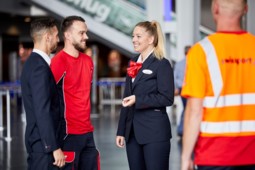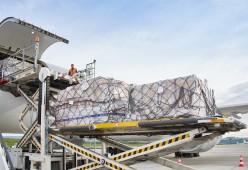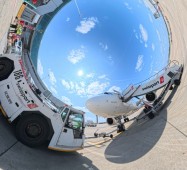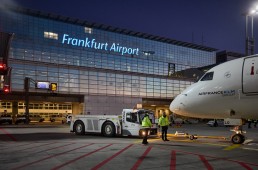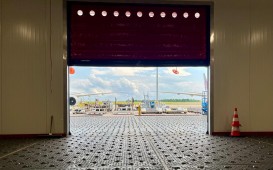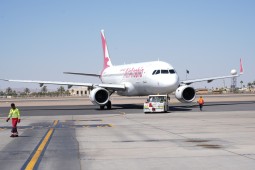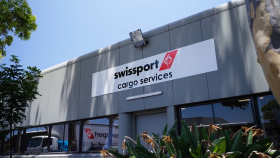The future of aviation: Warwick Brady op-ed in GHI magazine
Warwick Brady, President and CEO of Swissport, reflects on what the future holds for the aviation sector.
In global air travel, a sustainable trend reversal is now underway. Last year, travel volumes reached 47% of 2019 levels, and the International Air Transport Association (IATA) expects global demand to improve to 83% in 2022. By 2024, IATA forecasts passenger numbers to reach four billion, which is even a few percentage points above pre-Covid-19 levels. From there, I expect aviation to return to its long-term average of 4-5% growth per annum.
During peak travel seasons like Easter, Ramadan and the spring holidays, we have already seen pre-pandemic traffic levels at some airports. The recovery is so rapid that the entire sector—airlines and services companies—is struggling to find the people needed to ramp up. Swissport is creating some 17,000 additional jobs by the end of the summer, taking us past 60,000 people, which is roughly where we were before the pandemic.
But let us not fool ourselves: post-Covid is not pre-Covid. In fact, we see structural change in the aviation sector, and this is reason enough to take a moment to reflect on the future of civil aviation and the airport ecosystem as we see it at Swissport.
Government bailouts have kept the industry afloat through the pandemic. With airlines now emerging from the pandemic and ready to switch into high gear, many must repay loans from governments and other debt financing. Meanwhile, they are also burdened by significant interest payments. This means airlines now have additional incentives to tap into all efficiencies that are still in the system—and one such area is ground operations.
In my view, we will edge toward an ever more symbiotic collaboration between airlines, aviation service companies and airports. Service companies handling hundreds of flights a day at any given airport can achieve cost synergies which are completely out of reach for a single airline at a specific airport. Our passenger service agents, for example, efficiently move to the next departure gate as soon as a flight has been closed and can serve multiple airlines in a short time span. Similarly, our people on the ramp are allocated in real-time to service flights as arrival and departure times are changing throughout a busy day.
The high volume of flights we serve enables us to reduce idle times of our personnel and equipment, allowing us to realise significant cost savings. Airlines can tap into
these savings by partnering with service companies, and they increasingly do so. Swissport—thanks to its vast global operations at 285 airports on all six continents—can leverage additional economies of scale in overhead, training, system and equipment costs. And we can deliver the global service consistency that global airlines seek across their networks.
The range of services airlines choose to source from a third-party partner varies greatly. It can be limited to specific aspects of the value creation, like check-in and gate services, or the cooperation can comprise the full suite of ground services. Airlines may in some cases even source the entire hub management from an aviation service provider.
Expertise in hub management is a particular competence that we bring to the table at Swissport. Zurich Airport, where we have been serving Swiss International Air Lines with our best-in-class services since 2001, was our first full-suite hub operation. And among our more than 850 airline customers a growing number of carriers are expanding the range of ground services they are sourcing from us. Among them Finnair, for whom we manage the entire widebody and part of the European operations at their Helsinki hub and additionally operate their massive 31,000-square-metre COOL Nordic Cargo Hub facility. EasyJet relies on us at several European bases, for Azul Airlines in Brazil we provide full ramp handling services at their Viracopos hub in Campinas, and in Australia we provide ground handling for Qantas domestic flights at their Sydney and Melbourne hubs. United Airlines has entrusted us with five major cargo hubs, among them Newark, San Francisco and Washington-Dulles.
Such deeply integrated collaboration does not happen overnight. These are trust-based partnerships with our airline customers and airport partners which require time to grow. Therefore, we are putting customer centricity at the core of how we operate, and we are continuously working to maintain and deepen mutual trust. To this point, we have recently introduced a NPS-type program where Swissport managers at the airport level call their airline peers on a weekly basis to “check the pulse” and discuss issues. These calls are not always pleasant, but they are always helpful and lead to a better collaboration.
If airlines, airports and aviation service companies manage to take their collaboration to the next level, I see great potential for a mutually beneficial new normal, far beyond and above the pre-pandemic level. In every obstacle lies an opportunity. Let us seize this one.
Contacts
- Christoph Meier
- +41 (0) 43 815 00 22
- [email protected]

